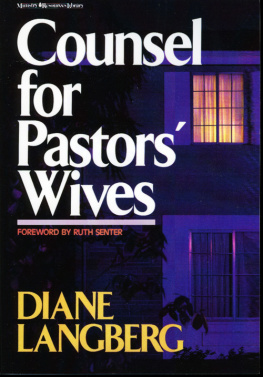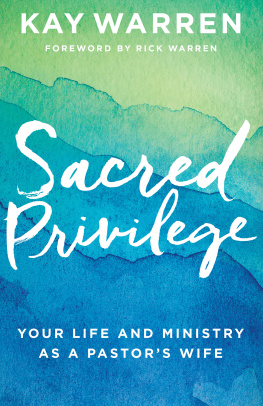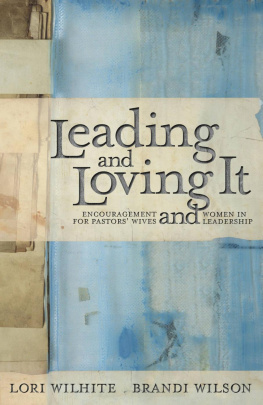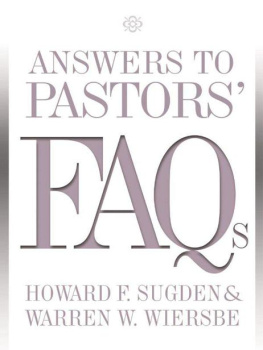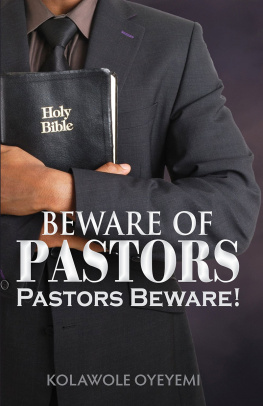To my husband, Ron, whose love and encouragement made this book and many other ministry adventures possible
I could almost feel the pain etched between the lines of the letter from a distraught pastors wife in Indiana. I wanted to reach out and give her a hug, hop a plane and rush to her side, and fix her hurt for her. Instead, I sat behind my desk at the Partnership offices and wondered who might help. I went through my files and pulled out a similar letter from another pastors wife. Stapled to it was a response from Diane Langberg.
From the first line of Dianes response I knew I had found someone who not only cared about hurting clergy but also knew how to communicate that care through her writing. Diane did not talk down to the hurting woman, but treated her with the greatest respect. She did not fill her response with shoulds and oughts or high-sounding lingo that only the professionals could understand. Instead, she was a comfortable friend pulling up a chair and coming alongside to encourage and give hope. Though she was thoroughly professional herself, I noted that Diane did not pass along simply her own opinions or the ideas of other professionals. She was not out to convince or impress with what she knew. Rather, she skillfully built upon biblical principles, weaving eternal truths into sound professional advice and practical application.
I knew I could not personally help the hurting pastors wife from Indiana whose letter I held in my hand. But I had found someone who could. I folded the letter and sent it to Diane, confident that I had been of special service to a pastors wife who needed an understanding friend and counselor.
Today, several years removed from that letter, I am more convinced than ever that Diane Langberg truly loves clergy couples and understands their unique position. She has offered hope and help to many through the pages of Partnership. May I be the first to introduce her to you through the pages of this book. She is my friend, and by the time you have finished reading Counsel for Pastors Wives, she will be your friend too.
Ruth Senter
October 1987
Dear Diane,
I have a concern about my pastor husband that I have not seen mentioned in any of the literature for those in the ministry. Perhaps it is an uncommon problem, but I do not think so. Several times a week my husband drinks at home or at a local bar. He sometimes stays at the bar until very late. I am terrified that one of the members of our church might see him. His credibility as a pastor could be questioned, his drinking could have an adverse effect on a new Christian, and drinking is frowned upon in our denomination. His father, also a pastor, would be very distressed if he knew. My husband calls this his recreation, but I see it as dangerous. If he were in any other profession, perhaps the consequences might not be so great, but in the ministry the discovery of his drinking could affect our lives drastically. He listens to nothing I say. What should I do?
Sincerely,
Beth
CHAPTER 1
Can My Husband and I Survive the Pastorate?
Dear Diane,
My husband is a seminary student interning at a local church. We hear many comments from other seminary couples and from those already in the ministry about problems we can expect to face when my husband becomes a pastor. Frankly, it is a bit overwhelming. We do not want to enter the pastorate naively, but neither do we want to be as negative as some appear to be. What problems should we expect to face? Will it be more difficult to maintain a good marriage while pastoring than if my husband had chosen a different career? Perhaps you could give us a realistic overview. Any suggestions (or warnings) will be appreciated.
Sincerely,
Beth
P roblems in the ministry seem almost fashionable today. The trials of clergy and their families are becoming increasingly a focus of concern among seminary and denominational administrators. I have counseled many aspiring pastoral couples who find the negatives they are hearing about frightening and even overwhelming. When one hears about burnout, broken marriages, mixed-up kids, and divided churches, one certainly can get the feeling that clergy couples risk losing more than they gain by their service to the church.
Whenever I conduct a seminar on ministry and its areas of difficulty, I am careful to acknowledge that I am proceeding from the down side. Much of what I say focuses on problems simply because those who visit my office come because of difficulties and questions they cannot resolve. Even in the most solid of pastoral marriages there may be recurring problems or patterns commonly shared by others in ministry. All clergy marriages must deal with tension between ministry and family. Ministry couples must also learn to live with a job that is never done; no matter what is accomplished, new needs arise and must be met. They struggle with living up to others expectations, with having the church determine their income, and with having their house belong to others and used as an extension of the church. These issues all contribute to the strain on pastoral marriages and result in frightening divorce statistics. More men are leaving the ministry due to discouragement and more ministry couples are divorcing than ever before.
Over my past ten years of counseling ministry couples, the majority of problems presented to me have usually fallen into one of two large categories: marriage/family difficulties or burnout. Struggles in those areas must be expected due to the type of work involved in the ministry and because of its intensity. These struggles do not need to be debilitating, however, nor must they inevitably result in the failure of either marriage or ministry. Whether or not problems get out of hand is in large measure dictated by the attitudes and expectations with which one approaches ministry.
I gladly will share with you my thoughts on both these areas. I do this to encourage you in your ministry rather than to frighten you with its negative possibilities. I pray that the joy of serving God in his church may be your first and most precious discovery in a new pastorate.
Lets look at marriage/family difficulties first. Many times couples feel as if marriage is in conflict with ministry. The attitude seems to be: If I really give to my marriage what all these books and counselors say I should, my ministry will suffer. Marriage is important, but my ministry is for God, and he deserves 100 percent. This type of thinking translates into the resolve that I will respond to anyone who calls at any time. If I have promised my wife that I will stay home, she will just have to understand that Gods work comes first.
Perhaps the bluntness of the above statement makes it seem like something that you would never say. However, this type of thinking can creep in subtly. The reason for this error is a misunderstanding of how marriage and ministry fit together. Many couples believe and live as if marriage and ministry do not fit together. They view these two areas as being in irresolvable conflict and feel that one must be subordinate. Frequently, this translates into a severe neglect of the family, because serving the Lord is more important. Those having this attitude define service to God as those spiritual things that take place outside the home.
Other couples believe that marriage and ministry ought somehow to fit together, so they run back and forth between the two. The fit is never comfortable or easy, but they enjoy some success from their juggling efforts.
The first approach, a neglect of the home, is clear disobedience to Gods standards for those who oversee his church. Paul tells us that [an overseer] must manage his own family well (1 Tim. 3:4). Obviously, a pastor cannot manage his home if he is never present. The second approach will not work when both areas make major demands at the same time. Those who try to take on both equally are prime candidates for burnout.

